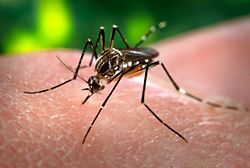Dengue Fever in Phuket
For the second year running, Phuket has suffered a significant outbreak of Dengue Fever. Also for the second year running, I have been one of the victims. I therefore feel well qualified to write something about this nasty little virus.
In 2006, there were only 136 reported cases of Dengue in Phuket and no deaths associated with the disease. In 2007, there were more than 500 reported cases of Dengue and three deaths were associated with the disease. At the start of July 2008, the Phuket Provincial Health Office reported that there are currently 200 islanders suffering from the disease, and one victim recently died.
These figures are not actually huge and certainly do not represent an epidemic. For an island that received 5-million visitors last year, 500 cases of Dengue is still a small number. In fact, I can't help but feel rather unlucky to have had it twice in two years. However, we must remember these are only the reported cases. Many cases of Dengue go unreported and many visitors will not notice the symptoms until they return home.
In fact, Phuket is not the only place to suffer a rise in the number of Dengue cases. The incidence of the disease is cyclical and there has been a worldwide increase in Dengue outbreaks over the last couple of years.
What is Dengue Fever?
 Dengue
Fever is a virus passed to humans by the bite of the Aedes mosquito, more
commonly known as the yellow fever mosquito. This mosquito is a daytime feeder.
You can recognise it from its thin white stripes.
Dengue
Fever is a virus passed to humans by the bite of the Aedes mosquito, more
commonly known as the yellow fever mosquito. This mosquito is a daytime feeder.
You can recognise it from its thin white stripes.
There are four distinct strains of Dengue Fever. Once you have recovered from one you will have lifelong immunity from that strain. Unfortunately, you do not gain immunity from the other strains. That means it is possible to have Dengue up to four times.
The incubation period before symptoms first appear is 3 - 14 days after the infective bite. That means many victims will return home from their holiday before they come down with the disease.
Dengue Fever is generally not fatal for healthy adults. However, it can be dangerous for the very young, old or weak.
Dengue Hemorrhagic Fever is a potentially lethal complication. It is not clear why some victims of the disease suffer this complication but it is believed that it is more likely to occur in patients who have secondary infections. Patients who suffer this complication can suffer bleeding and vomiting and will absolutely need hospitalisation and round the clock care.
Symptoms
Dengue Fever typically lasts six to seven days although it can take another one to two weeks for the patient to feel fully recovered.
- Fever: The disease starts with the onset of a high fever and severe headache. The intensity of the fever varies over the course of the disease. There are times when the fever fades away, giving the patient the impression they are improving only for the fever to return with a vengeance.
- Headache: The headache is constant and intense.
- Muscle and Joint Pains: This is what earns the disease its colourful nic-name 'break bone fever'. Brutal aches in the back, muscles and joints can cause extreme discomfort.
- Shivers and Chills: Despite the fever, the patient may well suffer periods of cold shivers running through the body.
- Loss of Appetite: The patient will suffer extreme loss of appetite.
- Face Flush: The patient's face may be flushed a pink or red colour.
- Rashes: the patient may suffer red rashes across the limbs or stomach.
- Bleeding from nose, mouth or gums: In extreme cases, the patient may bleed.
Treatment
There is no inoculation available for Dengue Fever. Research continues.
There is no antiviral treatment for Dengue Fever.
The main treatment is supportive. It is important to maintain fluid intake. Electrolyte rehydration drinks can help to keep the body hydrated.
The patient can take paracetemol to reduce the symptoms of fever and pain.
The patient should not take Aspirin as the blood-thinning effect can worsen the bleeding tendency associated with Dengue.
Prevention
Prevention is better than cure, especially when there isn't a cure. I can tell you from personal experience, you really do not want Dengue Fever. If you can avoid it until those wonderful scientific research people have come up with an inoculation, then that is the way to go.
There is only one way to prevent Dengue and that is to avoid mosquito bites. Do not leave still water around the house. Mosquitoes can breed in as little as a bottle top of water. Dengue fever is much more widespread during the rainy season months.
Wear mosquito repellant if you think there may be mosquitoes around. Remember the Aedes mosquito that spreads the Dengue virus is a daytime biter.
